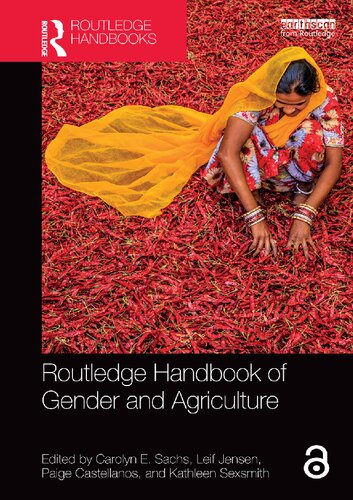

Most ebook files are in PDF format, so you can easily read them using various software such as Foxit Reader or directly on the Google Chrome browser.
Some ebook files are released by publishers in other formats such as .awz, .mobi, .epub, .fb2, etc. You may need to install specific software to read these formats on mobile/PC, such as Calibre.
Please read the tutorial at this link: https://ebookbell.com/faq
We offer FREE conversion to the popular formats you request; however, this may take some time. Therefore, right after payment, please email us, and we will try to provide the service as quickly as possible.
For some exceptional file formats or broken links (if any), please refrain from opening any disputes. Instead, email us first, and we will try to assist within a maximum of 6 hours.
EbookBell Team

4.1
10 reviewsMain subject categories: • Agriculture • Agriculture ‒ Economics aspects • Land use • Land use ‒ Planning • Land use ‒ Case studies • Women in agriculture • Women in agriculture ‒ Case studies
The Routledge Handbook of Gender and Agriculture covers major theoretical issues as well as critical empirical shifts in gender and agriculture.
Gender relations in agriculture are shifting in most regions of the world with changes in the structure of agriculture, the organization of production, international restructuring of value chains, climate change, the global pandemic, and national and multinational policy changes. This book provides a cutting-edge assessment of the field of gender and agriculture, with contributions from both leading scholars and up-and-coming academics as well as policymakers and practitioners.
The handbook is organized into four parts: part 1, institutions, markets, and policies; part 2, land, labor, and agrarian transformations; part 3, knowledge, methods, and access to information; and part 4, farming people and identities. The last chapter is an epilogue from many of the contributors focusing on gender, agriculture, and shifting food systems during the coronavirus pandemic. The chapters address both historical subjects as well as ground-breaking work on gender and agriculture, which will help to chart the future of the field. The handbook has an international focus with contributions examining issues at both the global and local levels with contributors from across the world.
With contributions from leading academics, policymakers, and practitioners, and with a global outlook, the Routledge Handbook of Gender and Agriculture is an essential reference volume for scholars, students, and practitioners interested in gender and agriculture.
Chapter 13 of this book has been made available as Open Access under a Creative Commons Attribution-Non Commercial-No Derivatives 4.0 license.